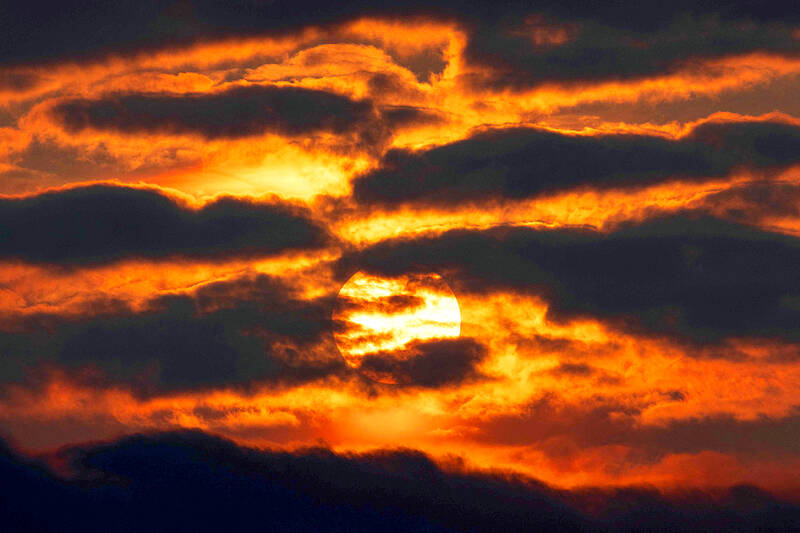Canada’s wildfires, which have already forced evacuations of more than 27,000 people in three provinces, on Tuesday continued their stubborn spread, with heavy smoke choking millions of Canadians and Americans and reaching as far away as Europe.
Alerts were issued for parts of Canada and in neighboring US warning of hazardous air quality.
A water tanker air base was consumed by flames in Saskatchewan, oil production has been disrupted in Alberta and officials warned of worse to come with more communities threatened each day.

Photo: AFP
“We have some challenging days ahead of us,” Saskatchewan Premier Scott Moe told a news conference, adding that the number of evacuees could rise quickly.
Every summer, Canada grapples with forest fires, but an early start to the wildfire season this year and the scale of the blazes — more than 2 million hectares burned — is worrying.
The provinces of Saskatchewan and Manitoba have been hardest hit. Both declared wildfire emergencies in the past few days.
“This has been a very difficult time for many Canadians,” Canadian Minister of Emergency Management and Community Resilience Eleanor Olszewski told reporters in Ottawa.
“This wildfire season has started off more quickly, and it’s stronger, more intense,” she said, adding that the Canadian military has deployed aircraft to evacuate remote towns in Manitoba and was ready to also assist Saskatchewan and Alberta with firefighting.
Climate change has increased the impact of extreme weather events in Canada, which is still recovering from the summer of 2023, when 15 million hectares of forests were scorched.
As of Tuesday, 208 fires were considered active across Canada. Half of them were listed as out of control, the Canadian Interagency Forest Fire Centre said.
The US Environmental Protection Agency’s AirNow map showed a swath of red for “unhealthy” conditions across the eastern half of Minnesota into western Wisconsin and northern Iowa. The map also showed purple for “very unhealthy” across much of the Minneapolis-St Paul metropolitan area.
Canada’s wildfires are so large and intense that the smoke is even reaching Europe, where it is causing hazy skies but is not expected to affect surface-air quality, the European climate service Copernicus said.
The first high-altitude plume reached Greece and the eastern Mediterranean a little more than two weeks ago, with a much larger plume crossing the Atlantic within the past week and more expected in coming days, Copernicus said.
“That’s really an indicator of how intense these fires are, that they can deliver smoke,” high enough that they can be carried so far on jet streams, said Mark Parrington, senior scientist at the service.
The fires also are putting out significant levels of carbon pollution — an estimated 56 megatonnes through Monday, second only to 2023, Copernicus said.
Additional reporting by AP

PRECARIOUS RELATIONS: Commentators in Saudi Arabia accuse the UAE of growing too bold, backing forces at odds with Saudi interests in various conflicts A Saudi Arabian media campaign targeting the United Arab Emirates (UAE) has deepened the Gulf’s worst row in years, stoking fears of a damaging fall-out in the financial heart of the Middle East. Fiery accusations of rights abuses and betrayal have circulated for weeks in state-run and social media after a brief conflict in Yemen, where Saudi airstrikes quelled an offensive by UAE-backed separatists. The United Arab Emirates is “investing in chaos and supporting secessionists” from Libya to Yemen and the Horn of Africa, Saudi Arabia’s al-Ekhbariya TV charged in a report this week. Such invective has been unheard of

US President Donald Trump on Saturday warned Canada that if it concludes a trade deal with China, he would impose a 100 percent tariff on all goods coming over the border. Relations between the US and its northern neighbor have been rocky since Trump returned to the White House a year ago, with spats over trade and Canadian Prime Minister Mark Carney decrying a “rupture” in the US-led global order. During a visit to Beijing earlier this month, Carney hailed a “new strategic partnership” with China that resulted in a “preliminary, but landmark trade agreement” to reduce tariffs — but

Chinese President Xi Jinping’s (習近平) purge of his most senior general is driven by his effort to both secure “total control” of his military and root out corruption, US Ambassador to China David Perdue said told Bloomberg Television yesterday. The probe into Zhang Youxia (張又俠), Xi’s second-in-command, announced over the weekend, is a “major development,” Perdue said, citing the family connections the vice chair of China’s apex military commission has with Xi. Chinese authorities said Zhang was being investigated for suspected serious discipline and law violations, without disclosing further details. “I take him at his word that there’s a corruption effort under

China executed 11 people linked to Myanmar criminal gangs, including “key members” of telecom scam operations, state media reported yesterday, as Beijing toughens its response to the sprawling, transnational industry. Fraud compounds where scammers lure Internet users into fake romantic relationships and cryptocurrency investments have flourished across Southeast Asia, including in Myanmar. Initially largely targeting Chinese speakers, the criminal groups behind the compounds have expanded operations into multiple languages to steal from victims around the world. Those conducting the scams are sometimes willing con artists, and other times trafficked foreign nationals forced to work. In the past few years, Beijing has stepped up cooperation